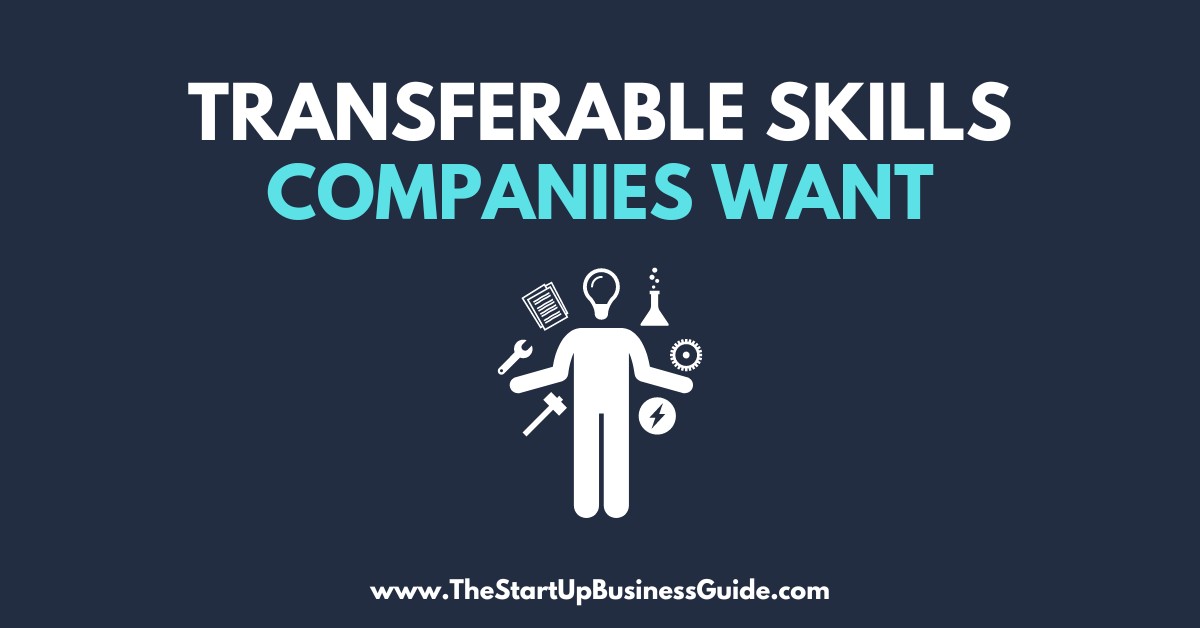20 Transferable Skills That Companies Want in You

If you’re currently looking for a job or thinking about making a career change, it’s important to understand the importance of transferable skills and how they can help you stand out in the job market.
First, let’s define what transferable skills are.
These are skills that you acquire through your experiences and education that can be applied to different jobs or industries.
They’re not specific to a certain field or profession, but rather can be used across different fields.
Now, you may be thinking, “Why are transferable skills important for me to have?”
The answer is simple: they make you a more valuable candidate for potential employers.
Companies want to hire employees who can adapt to different situations and bring a variety of skills to the table.
Transferable skills demonstrate to employers that you’re a well-rounded individual who can handle multiple responsibilities and tasks.
So, what are some examples of transferable skills?
20 Best Transferable Skills
Here’s a list of some of the most sought-after skills in the job market:
- Communication – being able to effectively communicate with others is crucial in any job.
- Leadership – the ability to take charge and guide others is an important skill for managers and team leaders.
- Problem Solving – being able to analyze situations and come up with solutions is a valuable skill in any field.
- Time Management – being able to prioritize tasks and manage your time effectively is key to success.
- Adaptability – the ability to adapt to changes and new environments is becoming increasingly important in today’s fast-paced job market.
- Teamwork – the ability to work well with others and collaborate is essential in most jobs.
- Interpersonal Skills – building strong relationships with colleagues and clients is an important aspect of many jobs.
- Technical Skills – having knowledge and experience with specific tools and technology can give you an edge in certain fields.
- Project Management – being able to plan, organize, and execute projects is a valuable skill in many industries.
- Strategic Thinking – the ability to think ahead and plan for the future is important for making important business decisions.
- Creativity – being able to think outside the box and come up with new and innovative ideas is a valuable skill in many fields.
- Critical Thinking – being able to analyze and evaluate information is important for making sound decisions.
- Organization – being able to keep things in order and maintain systems is important in many jobs.
- Decision Making – the ability to make quick and accurate decisions is crucial in many roles.
- Sales and Marketing – these skills are important for promoting products or services and building relationships with clients.
- Negotiation – being able to effectively negotiate and come to agreements is important in many fields.
- Financial Management – understanding financial concepts and being able to manage finances is important for many roles.
- Presentation Skills – being able to effectively present information and ideas is important for many jobs.
- Stress Management – the ability to handle pressure and stay calm is important in fast-paced and high-stress jobs.
- Emotional Intelligence – being able to understand and manage your own emotions, as well as the emotions of others, is important for building relationships and working well with others.
How to Develop and Highlight Transferable Skills
Now that you know some examples of transferable skills, you may be wondering how you can develop and highlight them.
Here are some tips:
- Identifying transferable skills in your current job or education – take a look at the tasks you’re currently responsible for and think about the skills you’re using to complete them. These are likely transferable skills that you can highlight on your resume and in job interviews.
- Gaining experience through internships, volunteer work, or side projects – these experiences can give you the opportunity to develop and showcase your transferable skills. For example, if you’re interested in developing your leadership skills, consider taking on a leadership role in a volunteer organization or starting your own small business or side project.
- Highlighting transferable skills on your resume and in job interviews – when crafting your resume and preparing for job interviews, make sure to highlight your transferable skills and give specific examples of how you’ve used them in the past. This will help potential employers see the value you can bring to their company.
- Developing transferable skills through training and education – consider taking classes or workshops to develop skills that are important to you. For example, if you’re interested in developing your technical skills, consider taking a course on coding or design.
FAQs on Transferable Skills
Q. What are transferable skills and why are they important for the job market?
Transferable skills are abilities that can be applied across different jobs and industries.
They are important for the job market because they demonstrate to employers that you possess valuable abilities that can be used in a variety of roles.
Q. What are some examples of transferable skills?
Examples of transferable skills include strong written and verbal communication, problem-solving, teamwork, adaptability, time management, and leadership.
Q. How do I identify my transferable skills?
To identify your transferable skills, consider your past experiences, such as education, work, and extracurricular activities.
Look for patterns in the tasks and responsibilities you have handled and the skills you have used to accomplish them.
Q. How can I highlight my transferable skills on my resume and during job interviews?
You can highlight your transferable skills on your resume by using specific keywords and phrases that describe your abilities.
During job interviews, provide examples of how you have applied your transferable skills in previous roles.
Q. How can I continue to develop my transferable skills?
You can continue to develop your transferable skills by taking classes, attending workshops or seminars, volunteering, or seeking out new opportunities at work.
You can also practice and hone your skills through intentional self-reflection and feedback from others.
Q. How do transferable skills differ from hard skills?
Transferable skills are abilities that can be applied across different jobs and industries, while hard skills are specific technical abilities and knowledge required for a particular job or industry.
Hard skills are more job-specific and often require formal education or training.
Q. Are transferable skills only important for entry-level positions?
No, transferable skills are important for all levels of positions, from entry-level to executive-level roles.
They demonstrate to employers that you’re a well-rounded individual who can handle multiple responsibilities and tasks, no matter the level of the position.
Q. Are there certifications for transferable skills?
While there may be certifications available for specific transferable skills such as project management or financial management, transferable skills are not typically something that can be certified.
However, you can take classes or workshops to develop a particular skill and get certification in those classes.
Conclusion
In conclusion, transferable skills are valuable assets in the job market.
They demonstrate to employers that you’re a well-rounded individual who can handle multiple responsibilities and tasks.
By identifying and developing your transferable skills, you’ll be able to stand out as a candidate and increase your chances of landing a job or advancing in your career.
So, take some time to reflect on your skills and experiences, and think about how you can develop and highlight your transferable skills in your job search and career advancement.






